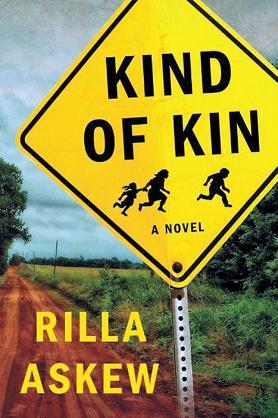
Kind of Kin
By Rilla Askew
(HarperCollins)
I first encountered the absorbing, beautifully written work of Oklahoma native Rilla Askew in her 2007 novel, “Harpsong.” I’ve since read her three earlier books and have eagerly anticipated a new one. Whatever topic she tackles, I have faith that Askew will gently yet forcefully knead it into something unforgettable.
“Kind of Kin” does not disappoint. In fact, it is so good, so cogent and poignant and dead-on perceptive, I would very much like to make it required reading for anyone who harbors strong opinions on immigration policy, on either side of the metaphorical border fence.
She sets “Kind of Kin” in 2008, among a tight-knit Southeast Oklahoma clan that’s cash-poor but rich in extended-family ties. Askew’s portrayals of family spats, nitpicking, loyalty and love bring the book much of its laugh-out-loud humor, even amid unsettling and daunting circumstances.
The novel opens with a line that should become an instant classic: “Your grandpa is a felon,” Aunt Sweet said. “A felon and a Christian. He says he’s a felonbecausehe’s a Christian. Now, what kind of baloney is that?”
The speaker, Georgia “Sweet” Brown Kirkendall, is talking about her father, Bob Brown, who’s in jail for the crime of allowing 14 illegal Mexican immigrants to take temporary shelter in his barn.
Askew structures the novel, in part, around a 2007 Oklahoma law that made it a felony for U.S. citizens to knowingly provide shelter, transportation or employment to illegal immigrants, and also a follow-up bill to make English the state’s official language.
The author focuses the legislative part of the story around a fiercely ambitious female state representative whose main concern is how she looks on camera: She rearranges legislative business and press conferences because her hair stylist has lightened her hair “way too platinum,” and getting that fixed takes priority.
Grandpa Bob, having joined forces with a Pentecostal pastor named Jesus (which in itself annoys some of the area’s citizens, including Sweet), has not only gone to jail, he intends to stay there, refusing bail or even legal counsel, to make his point about the unfairness of the law. Adding to Bob’s burden of conscience is that an in-law, Juanito, has been arrested and deported.
Askew gets right to the intimate heart of the immigration debate via Sweet’s interaction with Juanito’s daughter Concepcion. Sweet adores the child, but wants to call her Connie because, she says, “Concepcion was just too, well, Mexican. Not to mention Catholic.”
The narrative heats up with the disappearance of Sweet’s 10-year-old nephew and the revelation of the family member who turned Bob in.
As the title suggests, everyone here is “kind of kin” ― sisters who are more like mother and daughter, a cousin who takes on the role of bullying brother, side-by-side farmers whose families know every teensy detail of one another’s lives.
Askew leaves no doubt where she comes down on the immigration issue. But she does it with such grace, deftly juggling multiple narrators and viewpoints, that readers can’t help but see that the moral crossroads where the book stands has far more side alleys than you might imagine ― and the one you ultimately choose just mightnotbe the track you’d have marked on the map when first setting off on the journey.
(MCT)








